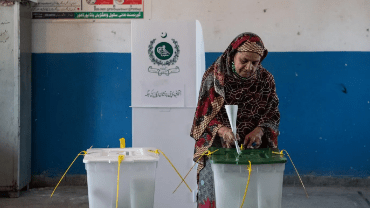
Social media platforms have been marred with issues in Pakistan for the last month and, at 11:20 a.m. ET Sunday, watchdog monitoring service Netblocks said X has been restricted in the country for a total of 24 hours, “the latest and longest in a series of nation-scale internet censorship measures imposed by authorities.”
Internet blackouts and a suspension of mobile phone service were reported across Pakistan on election day, which a Ministry of Interior spokesperson said was done by the government in response to “recent incidents of terrorism” in the country and meant to “maintain the law and order situation and deal with possible threats.”
Two days after the election, on Feb. 10, Pakistan experienced another large-scale X outage as evidence of election rigging began to surface online and political critics spoke against the county’s polling process.
On Saturday, the commissioner of Rawalpindi, Liaqat Ali Chattha, said he would hand himself over to police after admitting he helped to manipulate election results and “personally supervised” the switching of 70,000 votes—”we converted the losers into winners,” he reportedly said.
It is unclear who, if anyone, is behind the X outages reported Saturday and Sunday, and the company did not immediately respond to Forbes’ request for comment.
X owner Elon Musk, the world’s second-richest person, has not commented publicly on the outage.
KEY BACKGROUND
The election in Pakistan has been marred with trouble since before it began. Nine days before the election, popular leader Imran Khan, a former Prime Minister and founder of the Pakistan Tehreek-e-Insaf (PTI) centrist party, was sentenced to 10 years in jail. On Jan. 30, Khan was convicted of exposing state secrets after waving a confidential document at a rally. Following the conviction, the party’s symbol was banned from being used to identify party candidates on national ballots and all PTI candidates were forced to run as independents. The move was slammed as causing an accessibility issue for many in the country, where 62% of the population is illiterate. Khan’s main opposition, Nawaz Sharif of the center-right Pakistan Muslim League-Nawaz (PML-N) party and the preferred candidate of the Pakistan military, was also cleared of long standing charges against him ahead of the election. Despite the meddling, PTI-backed candidates did gain more votes than those of any other party, winning 93 of 264 seats. Because each candidate ran as an individual, however, it was PML-N that resulted as the largest single-party winner in parliament with a second-place 75 seats. Both groups have claimed victory, and Sharif said he plans to form a coalition government.
WHAT TO WATCH FOR
If Chatta’s confession will force Pakistan to reconsider its election results. PTI has called for the resignation of the country’s chief election commissioner and the Pakistan Peoples Party (PPP) has also demanded an inquiry into the claims of election rigging, according to the Times of India.
BIG NUMBER
- That’s how many people were killed in two political attacks in Balochistan province ahead of the election, part of a wider rash of election-related violence in Pakistan. The bombings near electoral offices in Balochistan killed at more than two dozen, a soldier was killed in a shooting on Election Day and, in the district of Dera Ismail Khan, five police officers were killed and grenades were thrown at local polling stations, Time reported.






